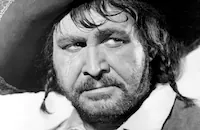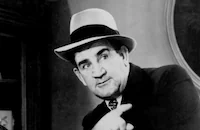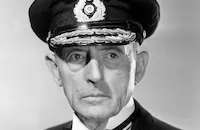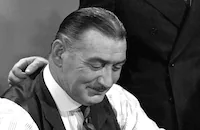Torchy Gets Her Man

Brief Synopsis
Cast & Crew
William Beaudine
Glenda Farrell
Barton Maclane
Tom Kennedy
Willard Robertson
George Guhl
Film Details
Technical Specs

Synopsis
Reporter Torchy Blane is in the police station when Gilbert, a secret service agent, asks the police for help in catching a counterfeiter known as $100 Bailey, who is passing hundred dollar bills. He tells police detective Steve McBride that the man he suspects will pass the money at the racetrack and convinces Steve to let him watch the $100 betting window. Captain McTavish dispatches Sergeant Gahagan with a letter to confirm Gilbert's identity, but, unknown to the police, Gilbert is actually Bailey and he intends to use his position at the racetrack to pass counterfeit money under the eyes of the police. Gilbert switches McTavish's letter with one written by a member of his gang, and his cover is maintained. McTavish forbids Steve to tell Torchy about the investigation, but determined to get her story, Torchy follows Gilbert from the racetrack. Gilbert notices her on his tail, however, and loses her. By questioning Gahagan, Torchy figures out what the investigation is about, but when she writes the story, her editor explains that they have been asked not to publish anything on the subject in order to keep the operation secret. Torchy is still suspicious, so she marks Gilbert's automobile tire with creosote and borrows a dog to track the scent. With Gahagan's help, Torchy discovers Gilbert's hideout, but they are spotted by Gilbert's men and kidnapped. Torchy sends the dog to get help. Meanwhile, Steve has begun to worry about Torchy. Gilbert's response makes him suspicious and when the dog shows up without Torchy, Steve sets off in search of her. They arrive just before a bomb is set to go off, and Bailey panics, revealing Torchy's hiding place.

Director
William Beaudine
Cast

Glenda Farrell

Barton Maclane

Tom Kennedy
Willard Robertson
George Guhl

John Ridgely
Tommy Jackson

Frank Reicher
Joe Cunningham
Herbert Rawlinson
Frank Shannon
Edward Raquello
Greta Meyer

Ed Keane
Nat Carr
John Harron
Loia Cheaney
Cliff Saum

Jack Mower
Leo White
Stuart Holmes
Jack Goodrich

Paul Panzer
Al Lloyd
Jack Wise
Alice Connor
Vera Lewis
Sally Sage
Crew

Film Details
Technical Specs

Articles
Torchy Gets Her Man
A New York stage actress, Farrell had made an impression in her first film role as Douglas Fairbanks's girlfriend in Little Caesar in 1931. Warners offered her contract the following year, and she repeated her stage role in the film version of the play Life Begins. She settled in at Warners, giving impressive supporting performances in A-pictures such as I Am a Fugitive from a Chain Gang (1932) and starring roles in B-films. By 1937, the always-dependable Farrell was handed her own B-series, playing a character that had originally been male in Frederick Nebel's McBride and Kennedy magazine stories about a cop and a reporter investigating crimes together. Farrell played smart, wisecracking journalist Torchy Blane, who helped her not-too-bright gumshoe boyfriend solve crimes.
The Torchy films were each about an hour long, made quickly and cheaply, and the studio cranked them out at the rate of three a year, thanks to directors like the prolific Beaudine, known as "One Shot" because he rarely made more than one take. Nevertheless, Farrell took the films and her character seriously. In an interview, she said that prior to Torchy, women reporters in films "were caricatures of newspaperwomen as I knew them. Before I undertook to do the first Torchy, I determined to create a real human being...I met those who visited Hollywood and watched them on visits to New York City. They were generally young, intelligent, refined, and attractive. By making Torchy true to life, I tried to create a character practically unique to the movies."
Nevertheless, after four Torchy films and roles in dozens of other movies, Farrell decided it was time to move on when her Warner Bros. contract expired, and she decided to go freelance. Warners continued the Torchy Blane series, casting Lola Lane and Paul Kelly as Torchy and Steve in one film, Torchy Blane in Panama (1938). But the new team had no chemistry, and the film did not do well at the box office, so the studio coaxed Farrell and MacLane back for Torchy Gets Her Man and two more Torchy Blane films. In the ninth and final installment of the series, Torchy Blane...Playing with Dynamite (1939), Jane Wyman (who had played a bit part as a hatcheck girl in the first Torchy Blane film, Smart Blonde, 1937) played Torchy and Allen Jenkins replaced MacLane.
Among the fans of the Torchy Blane movies was the co-creator and writer of the Superman comic books, Jerry Siegel. He acknowledged that he based the character of "gutsy, beautiful headline-hunting reporter" Lois Lane on Glenda Farrell's portrayal of Torchy-even though he gave her the last name of Lola Lane.
Another Farrell fan was writer-director Garson Kanin, who noted in a New York Times tribute after the actress's death in 1971 that she was the prototype for a certain kind of 1930s movie heroine: "She invented and developed that made-tough, uncompromising, knowing, wisecracking, undefeatable blonde. Whether she was the Girl Friend of the star, a cynical secretary, a salesgirl, a world-weary wife, a madam, homesteader, or schoolteacher-she was always, relentlessly The Type."
by Margarita Landazuri

Torchy Gets Her Man
Quotes
Trivia
Notes
According to Variety, the racetrack scenes were filmed at Hollywood Park racetrack in Inglewood, CA, in which Warner Bros. had financial interests. This film marked the return of Glenda Farrell and Barton MacLean to the "Torchy Blane" series. For more information on the series, consult the Series Index and see entry above for Smart Blonde.















